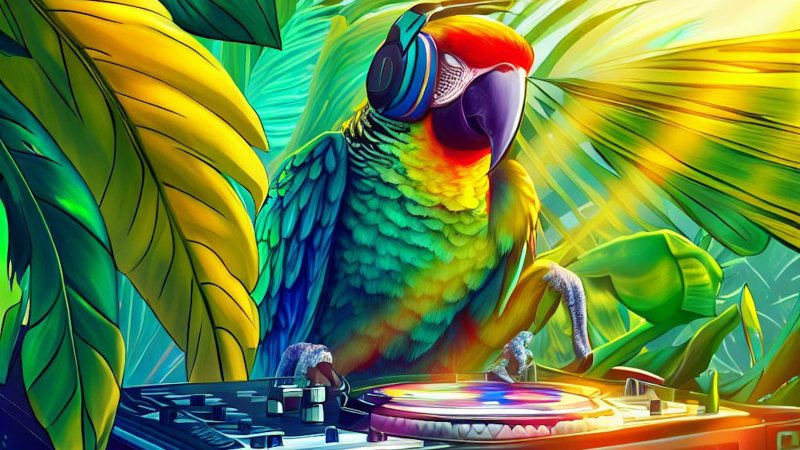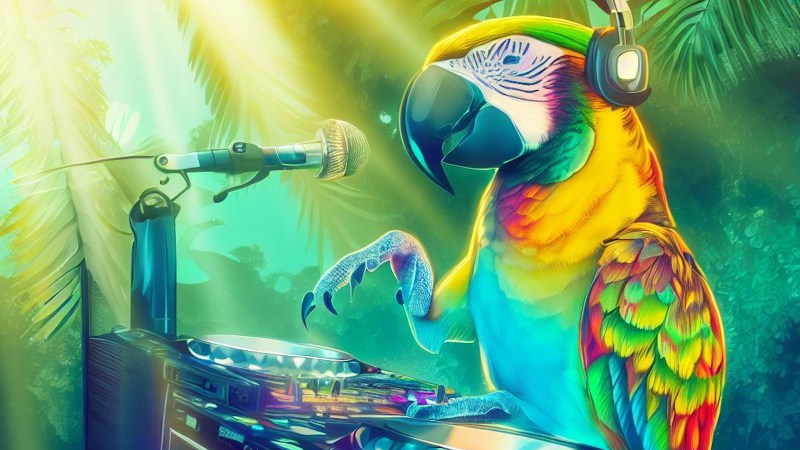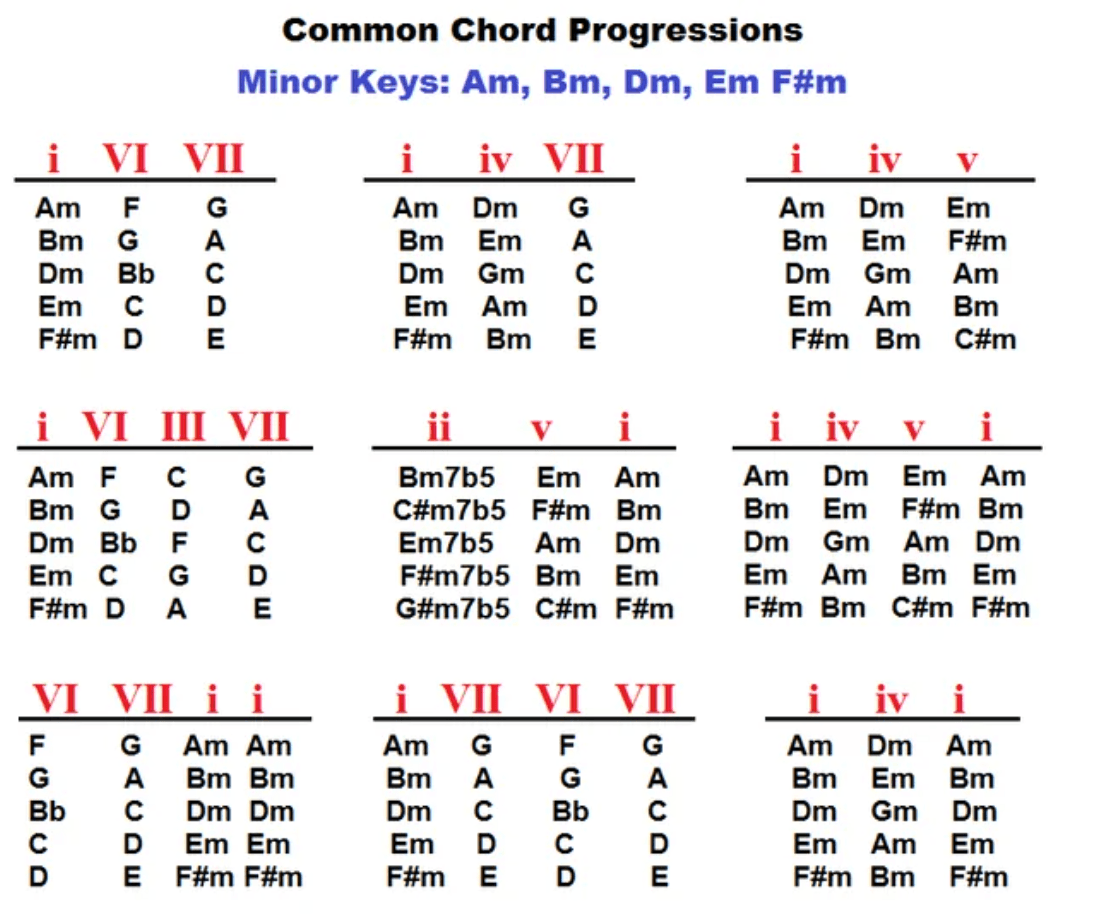In the thrilling realm of music, you may find yourself wondering, which DJ software is best for beginners?
Dive in, and not only will you find out the best software for budding DJs, but you'll also get acquainted with AI's groundbreaking role in music!

Key Features in a DJ Software for Newbies
Choosing the right software is a vital first step for every aspiring DJ. The right audio production tool can mean the difference between smooth sailing and choppy waters.
If you're embarking on this musical journey, it's crucial to be aware of what constitutes a premium DJ software, especially for beginners.
1. User-Friendly Interface
In the world of DJing, speed and efficiency are key. Newbies need a software interface that's clean and straightforward, making it easier to find what you're looking for.
An intuitive interface minimizes the learning curve, helping beginners to start mixing tracks without getting bogged down by overly complex controls.
2. Comprehensive Built-In Tutorials
Embarking on the DJ journey is thrilling, yet it comes with its set of hurdles. This is where integrated tutorials come into play as a pivotal asset.
Offering detailed, step-by-step guidance, these tutorials help beginners grasp foundational skills and delve into advanced methods, paving the way for a seamless evolution from novice to expert.
3. Unwavering Software Stability
The last thing any DJ desires, particularly during a live performance, is a software meltdown. Software reliability isn't merely a luxury; it's an absolute necessity.
Reliable software gives DJs the confidence to perform without fear of technical glitches throwing off their groove.
4. Rich Library of Pre-loaded Effects
Effects are the special sauce that adds flair to a mix. Beginners will benefit immensely from software that comes packed with pre-loaded effects.
From reverb and delay to flangers and beat loops, having a diverse range of effects at one's fingertips empowers budding DJs to experiment and find their unique sound.
5. Seamless Hardware Compatibility
DJ software is just one piece of the puzzle. Ensuring your chosen software integrates perfectly with your DJ controller, mixer, or other equipment is paramount.
Hardware compatibility guarantees that all the physical and digital tools work in harmony, setting the stage for an impeccable DJ set.
Top DJ Softwares Tailored for Beginners
For those of you embarking on the DJ path, starting with the right software can make all the difference.
Let's check out some of the top options tailored for beginners.
1. Serato DJ: The Go-to for DJing Veterans and Newbies Alike
Serato DJ has been a preferred choice for countless budding DJs and seasoned remix artists alike. This audio production software has Skrillex's stamp of approval, boasting a streamlined interface that makes mixing tracks feel like a breeze.
It offers three different versions - Lite, Pro, and Suite. Even its free version - Lite - dazzles users with features such as EQ, beatmatching, filters, effects, and scratching capabilities.
Its compatibility across a plethora of DJ hardware and operating systems makes it a standout.
- Pros: Compatible with both Windows and Mac. The free version is highly feature-rich. Supports a multitude of hardware.
- Cons: Serato DJ Pro is only compatible with specific hardware.
2. DJ.Studio: Making DJing Intuitive for Beginners
Eager to grasp the fundamentals of DJing? DJ.Studio might be your best companion. It simplifies the entire process, ensuring you're producing music within minutes.
The software's standout feature is its AI-assisted mixing algorithm that seamlessly scans your music library to identify tracks that are harmonious in BPM and key.
- Pros: AI-powered algorithm. Offers a one-month free trial. Unique workflow.
- Cons: Not optimal for live performances or mixing. Scratch DJs might find limitations.
3.Virtual DJ: A Legacy in DJ Software
Despite being one of the oldest players in the DJ software realm, Virtual DJ has retained its charm. Its all-encompassing range of effects and flexibility in deck choices make it a hit among beginners.
Plus, its capability to tackle video mixing, podcast recording, and even karaoke further accentuates its appeal.
- Pros: Generous feature set even in free mode. High compatibility with hardware. Strong library support.
- Cons: Sound quality may not rival other software. Free mode restricts controller use.
4. Rekordbox: Born from the Masters, Pioneer
Thanks to its lineage - crafted by Pioneer - Rekordbox enjoys a unique advantage. Its friendly interface and exhaustive music library resonate particularly well with beginners.
Add to this the allure of cloud storage and automatic backups, and you have a software that safeguards your mixes.
- Pros: Intuitive interface. Diverse performance features. Extensive library management.
- Cons: Restricted compatibility, mainly with Pioneer hardware.
5. Traktor DJ: The Remixing Prodigy
Traktor DJ, a brainchild of Native Instruments, stands out for its live remixing prowess. Despite its somewhat intricate interface, it provides an array of customization options, ensuring DJs can mold it as per their convenience.
- Pros: Wide feature palette. Adaptable interface. Supports various hardware.
- Cons: Interface might seem daunting to some.
6. Mixxx: The Powerhouse That's Absolutely Free
Mixxx shatters the misconception that free means featureless. This open-source marvel impresses with functionalities like iTunes integration, pitch bending, and BPM detection.
- Pros: Completely free with pro features. Open source.
- Cons: Interface may not be visually appealing. Absence of direct support.
7. Algoriddim DJay: The Apple of DJ Software
Originally designed for Mac, Algoriddim DJay now welcomes Windows users. Its tools empower DJs to blend audio and video seamlessly. Plus, its connectivity with platforms like SoundCloud and iTunes simplifies music sourcing.
- Pros: Supports most DJ hardware. Impressive filter effects.
- Cons: Lacks a robust video component. Djay Pro for Windows may not be as smooth as Mac.
8. Ableton Live: Beyond DJing, a Producer's Dream
Ableton Live isn't just for DJs. It's a holistic audio production tool that even pros like Marshmello swear by. Its design caters to audio loop creation and mixing, enabling DJs to push their creative boundaries.
- Pros: Diverse sound palette. Custom controllers. Exceptional live production tool.
- Cons: Premium version might strain your wallet.
9. Mixvibes Cross DJ: French Excellence in DJing
Hailing from France, Mixvibes Cross DJ shines with its customizable, beginner-friendly interface. Its free version is a gem, integrating with iTunes and supporting dual decks.
- Pros: Supports multiple controllers. Automix features.
- Cons: Crucial features like MIDI support demand an upgrade.
10. Deckadance: Dive into DJing without Preparation
With Deckadance, spontaneity is key. This Image-Line creation lets DJs drop tracks on the go, with no set preparation. Mix on up to four decks and explore a range of audio effects.
- Pros: User-centric knobs. User-friendly layout. Pocket-friendly pricing.
- Cons: Not the best for editing mixes.

The AI Innovation: Empress AI Tools for DJs
The music realm is experiencing a monumental change, and leading this evolution is artificial intelligence. Harnessing cutting-edge AI innovations, Empress AI presents an array of tools that redefine the craft of DJing.
While the essence of DJing is rooted in individual creativity and skill, Empress stands as a testament to the synergistic potential of human-art and AI intelligence.
1. Dynamic Remix Tool
One of the flagship features of Empress AI DJ Tools is the Dynamic Remix Tool. Think of this as having an AI sidekick in your studio.
By merely inputting a track, this tool instantly reshapes and modifies it, ensuring it resonates with your unique musical signature.
For DJs experiencing a creative rut or those looking to infuse a fresh perspective into their mixes, the Dynamic Remix Tool can be an invaluable asset.
It’s like having a co-producer who understands your style inside out, helping you sculpt music that stands out.
2. Setlist Synth
Playlists are passé. In the age of AI, what you need are musical narratives, and that's precisely what Setlist Synth offers.
Unlike traditional setlists that are often a mere collection of tracks, Setlist Synth curates sequences that tell a story.
Its predictive, intuitive, and adaptive nature ensures that the energy and flow of your DJ set remain unparalleled.
So, the next time you're playing at a gig or a house party, you can be confident that your setlist isn't just another playlist but a crafted musical journey.
3. Tempo Twin
Matching the BPM (Beats Per Minute) of tracks is fundamental to a DJ’s craft. Tempo Twin takes this to the next level.
Recognizing the pulse of the crowd and the energy on the dance floor, this tool ensures that every track you transition into aligns perfectly in terms of BPM.
This not only preserves but amplifies the dance floor's energy, ensuring a seamless and electrifying musical experience for your audience.
4. SEO and AI Marketing Assistance: Amplify Your Reach
In the digital age, making music is only half the battle. Ensuring it reaches the right audience is equally crucial.
Empress doesn't stop at just helping you create; it also aids in amplifying your reach with innovative AI marketing tools.
With tools tailored for optimizing your mixes for platforms like YouTube and Instagram, you can ensure that your music doesn't just sound good but also garners the attention it deserves.
Self-learning Methods for DJs
The art of DJing is a captivating blend of technical expertise, musical intuition, and sheer passion.
While structured courses and institutions provide foundational learning, self-learning methods have emerged as a dynamic alternative, often favored for their flexibility and adaptability.
For those DJs taking the solo route in their quest for mastery, here's a comprehensive guide:
YouTube & Video Tutorials
In the digital age, platforms like YouTube are a veritable goldmine for DJs looking to learn.
Ranging from basic beat-matching techniques to complex mixing strategies, YouTube channels dedicated to DJing offer a wealth of knowledge.
Beyond YouTube, platforms such as Skillshare, Udemy, and Coursera also offer specialized courses created by industry experts.
The accessibility, range, and often affordable nature of these resources make them a go-to for many aspiring DJs.
Craft Refinement
There's nothing quite like direct practice. Diving into the process of blending tracks, exploring different transitions, or simply engaging with your DJ equipment – each moment is a learning journey on its own.
By creating a consistent practice routine, you're not just honing your skills but also developing your unique sound and style.
Remember, while learning concepts and techniques are crucial, applying them through relentless practice is what truly sets you apart.
Engaging with the DJ Community
One of the most invaluable resources for a DJ is the collective wisdom of the community.
Engaging with fellow DJs, attending local gigs, joining DJ forums online, or even participating in workshops can open doors to insights, tricks, and techniques you might not come across elsewhere.
By networking, you’re not just learning but also creating opportunities for collaboration, gigs, and mentorship.

Your Next DJ Partner: Empress
Why not elevate your DJ journey with tools that refine and redefine your creative process? Empress is not just an AI music tool but a companion in your musical adventures. Give Empress a spin and amplify your DJ sets today!
FAQs: DJ Software Solutions
Q1: How essential is hardware compatibility in DJ software?
Crucial. It ensures that your chosen software works seamlessly with your DJ controller or mixer.
Q2: Are there free versions of these DJ softwares available?
Yes! Many, like Mixxx and Virtual DJ, offer free versions with slightly limited features.
Q3: How can AI tools help new DJs?
AI tools, especially from Empress, offer assistance in generating chords, melodies, and set lists, aiding in the learning process.
Q4: Is self-learning enough, or should I consider professional courses?
While many have succeeded with self-learning, professional courses can offer structured learning and networking opportunities.
Q5: How can Empress help with marketing my DJ sets?
Empress provides tools for SEO tags, YouTube descriptions, and Instagram captions to optimize your online presence.
Follow the future of music with Empress. Check out our blog to learn how you can effectively use these AI music tools.


